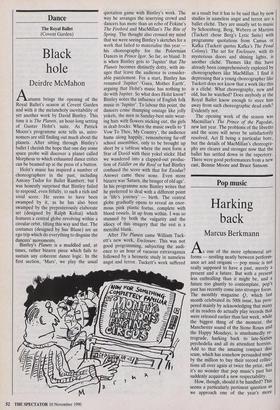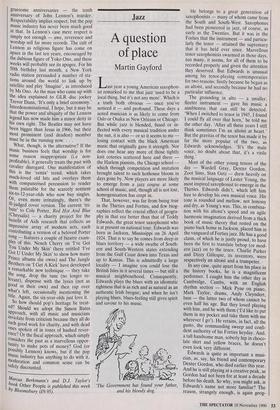Pop music
Harking back
Marcus Berkmann
As one of the more ephemeral art- forms — nestling neatly between perform- ance art and origami — pop music is not really supposed to have a past, merely a present and a future. But with a present less enthralling than it might be, and a future too ghastly to contemplate, pop's past has recently come into stronger focus. The monthly magazine Q, which last month celebrated its 50th issue, has pros- pered mainly by acknowledging that manY of its readers do actually play records that were released earlier than last week, while the biggest thing of the moment, the Manchester sound of the Stone Roses and the Happy Mondays, is unashamedly re- trograde, harking back to late-Sixties psychedelia and all its attendant horrors. Add to that the amazing compact disc scam, which has somehow persuaded mugs by the million to buy their record collec- tions all over again at twice the price, and it's no wonder that pop music's past has suddenly acquired a new respectability. How, though, should it be handled? This seems a particularly pertinent question as we approach one of the year's more gruesome anniversaries — the tenth anniversary of John Lennon's murder. Respectability implies respect, but the pop music industry has never been much good at that. In Lennon's case mere respect is simply not enough — awe, reverence and worship sell far more records. The cult of Lennon as religious figure has come on apace in the last ten years, encouraged by the dubious figure of Yoko Ono, and these weeks will probably see its apogee. For his 50th birthday last month, a New York radio station persuaded a number of sta- tions around the world to link up by satellite and play Imagine', as introduced by Ms Ono. As the man who came up with the idea explained to GLR disc jockey Trevor Dann, 'It's only a brief ceremony.' Interdenominational, I hope, but it may be that the power and ubiquity of the Lennon legend has now made him a minor deity in his own right. The Beatles may not have been bigger than Jesus in 1966, but their most prominent (and deadest) member must be in the running now. . . . What, though, is the alternative? If the music business feels that worship is for some reason inappropriate (i.e non- profitable), it generally treats the past with cavalier disregard. One manifestation of this is the `remix' trend, which takes much-loved old hits and overlays them with computerised percussion to render them palatable for the scarcely sentient six-to-12-year-olds who now buy singles. Or, even more irritatingly, there's the III-judged cover version. The current `tri- bute' to Cole Porter, Red Hot And Blue (Chrysalis) — a charity project for the benefit of Aids research that collects an Impressive array of modern acts, each contributing a version of a beloved Porter song ___ features a couple of bizarre exam- ples of this. Neneh Cherry on `I've Got You Under My Skin' (here retitled 'I've Got U Under My Skin' to show how many Prince albums she owns) and The Jungle Brothers on `I Get A Kick' have developed a remarkable new technique — they take the song, drop the tune (no longer re- levant), dispense with the lyrics (not as good as their own) and then rap over What's left, occasionally mentioning the title. Again, the six-year-olds just love it. So how should pop's heritage be treat- ed? Should we adopt the Simon Bates a. pproach, with all music and musicians inviolate from criticism because they all do such good work for charity, and with dead ones spoken of in tones of hushed rever- ence? Or the fiscal approach, which simply considers the past as a marvellous oppor- tunity to make pots of money? God (or possibly Lennon) knows, but if the pop music industry has anything to do with it, moderation and common sense can be safely discounted.
Marcus Berkmann's and D.J. Taylor's book Other People is published this week by Bloomsbury (£9.95).



































































 Previous page
Previous page